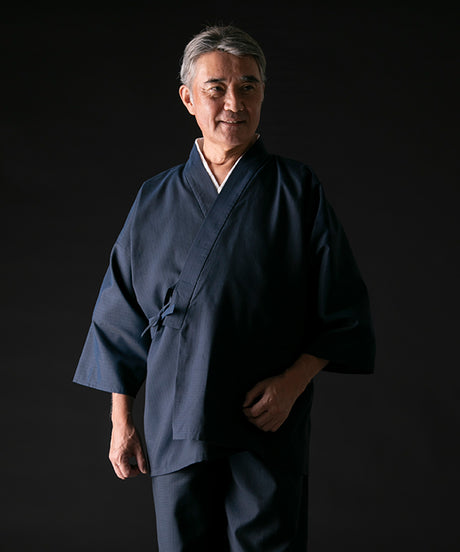Fabrics for Making Traditional Japanese Samue

WASUIAN manufactures and sells samue made of different fabrics to meet the needs of each season and purpose of use. Even though the products may seem similar, the processes required differ significantly depending on the material used. Our factory makes our products with great care through repeated trial productions.
Our products use fabrics made in Japan. Sometimes, we collaborate with fabric makers to create original materials. We are proud to say that no other brand uses as many domestic fabrics and produces as many different types of samue as we do.
In this blog, we will introduce the types of fabrics we use and the characteristics of each. We want to help you learn why we are so particular about our materials and why we're committed to producing only the highest-quality samue and jinbei.
Cotton

Cotton fabric has been used for samue for a long time, and is the most common fabric. We carry a wide variety of 100% cotton fabrics, from lightweight options for summer to thicker ones for winter.
The charm of cotton is its softness and comfort. The gentle feel of natural material makes it comfortable for everyday wear and sleepwear. Some fabrics are woven by combining different colored threads. This gives the fabrics a deeper coloring and detailing that will always look beautiful and interesting.
Samue and jinbei made from 100% cotton are great for people new to traditional Japanese clothing. They also make great gifts as they're comfortable to wear.
Recommendation
Sashiko-Ori (Stitch Weave)

Among cotton fabrics, Sashiko-ori (stitch weaving) is one of the most distinctive. This traditional Japanese handicraft originated to strengthen garments and improve heat retention during winter. Patterns were incorporated, expressing wishes for a good harvest and to protect against evil spirits.
Sashiko-ori fabric, created by mechanizing the production process of Sashiko, is generally woven with a uniform pattern of dots on a dobby loom. Its durability made it the standard choice for martial arts wear, such as in judo and kendo.
This fabric has a subtle shading on the surface that plain weave does not have, a wrinkle-resistant and firm feel, and a rugged yet refined texture. We use this fascinating stitch weave for our samue meant for the fall and winter seasons.
Recommendation
Asa (Hemp, Linen, Ramie)

The Japanese word Asa "麻" is a generic term for fabrics made from plant fibers, such as hemp, linen, and ramie, mainly produced from the tough fibers of the plant's stem.
Although each fabric is made from different plants, their characteristics are similar, such as excellent air flow, quick drying properties, and lightweight. Due to their ability to keep the wearer cool, they have long been used for Japanese apparel designed for summer, including samue and jinbei.
The fabrics we offer are characterized by their smooth texture, minimizing the rough or stiff qualities typical of fiber-based fabrics. Asa is the most cooling material in our fabric lineup. If you are looking for a comfortable garment to escape the summer heat, please check our Asa-made samue.
Recommendation
Polyester and Nylon

We also offer products made of 100% polyester fabrics, Tetron cotton (TC) fabrics (a blend of cotton and polyester), and nylon fabrics. These functional fabrics are stain-resistant, easy to dry after washing, and wrinkle-resistant, making them ideal for daily wear.
We use fabrics that have been developed and manufactured to achieve the same conveniences and comfort as natural materials. For example, polyester samue are popular at traditional Japanese inns and hotels that use them as uniforms, because they can be washed frequently, don't wrinkle easily, and are elegant enough to wear in front of guests.
For those who need samue as work wear or are looking for a material that is easy to care for and durable, we recommend our samue made of these synthetic fabrics.
Recommendation
Denim

For those who prefer samue with a fashionable or slightly modern twist, we recommend samue made of denim. Denim originated as workwear and became popular as a fashion item for everyday wear. This is similar to the role of samue in traditional Japanese clothing.
We have collaborated with Japan's largest denim manufacturer, Kaihara Corporation, to produce several samue using their high-quality fabric.
These samue are not stiff or rough, making them comfortable to wear. In Japan, several inns and hotels have adopted our denim samue as their indoor wear for guests. Just like with jeans, this unique samue allow you to enjoy denim's iconic color fading and aging over time. We hope you will try them.
Recommendation
Indigo and Botanical Dyed Fabrics

Traditional plant-dyed samue are an excellent example of the spirit of Japanese culture and craftsmanship in our product lineup. Fabrics dyed with naturally derived materials such as Kakishibu (persimmon tannin) and Kuchinashi (gardenia) are characterized by their natural and soothing colors.
Particularly popular is the beautiful dark blue Aizome (indigo-dyed) samue. Indigo has long been popular in Japan as a color symbolizing victory and good fortune. Long known worldwide as "Japan Blue," indigo remains a special color for Japanese people.
Owners of our plant-dyed samue enjoy how their colors change over time, eventually giving them a charming vintage look. Take a look at the options we have available that use this unique fabric.
Recommendation
Pure Silk

Silk has long been the primary material used for traditional kimonos. Since silk fabric is delicate and requires meticulous care, it is rarely used to make samue, because of their original purpose as work clothes.
At WASUIAN, we have combined these seemingly contradictory elements to create a samue and a haori made of pure silk. Customers who have purchased this samue have commented that they are perfect for dressing up for special occasions, such as inviting guests to one's home or for events and celebrations.
The luxurious feel and gorgeous shine unique to silk make you feel as if you are wearing a top-quality kimono. Those looking for a unique piece of clothing that takes samue to the next level and those with an eye for silk fabrics are sure to enjoy these samue.
Recommendation
Quilted Fabric

Our quilted fabric samue with padding are the most heat-retentive among our products. Often worn as relaxing wear in winter, they are also perfect for gardening, and household chores, especially when moving between the inside and outside. In Japan, they are also used by people working in temples and shrines, where it is difficult to keep warm, even with heaters.
While their excellent insulation provides warmth, they are light and allow freedom of movement. The sleeves and pant hems are elastic, so they keep the heat in and do not get in the way when you are working or doing your chores.
For those who want to stay warm inside their homes during the cold seasons, these samue will be a great companion that you will not be able to part with once you put it on. They also make perfect gifts for those who live in cold regions.
Recommendation
Our Commitment to High-Quality Fabrics

WASUIAN is committed to using domestically produced fabrics to provide our customers with high quality, comfortable samue suitable for various seasons and occasios.
We want to preserve traditional Japanese textiles and manufacturing techniques for future generations. The fabrics developed over many years of research are all of excellent quality and filled with the knowledge and skills of artisans. In fact, some fabric makers we work with have been in business for over a thousand years.
To make the best use of these fabrics, we create each samue with extra care at our in-house factory. We develop new samples many times, continuously work to improve without compromise and sell our products at fair prices.
WASUIAN will continue to deliver samue, a small piece of traditional Japanese culture and craftsmanship, to the world.




![5038 Stretch Twill Samue [HIJIRI]](https://cdn.shopify.com/s/files/1/0273/1953/3683/files/2402a-10.jpg?v=1707804211)



